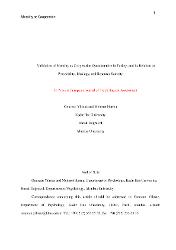| dc.contributor.author | Yılmaz, Onurcan | |
| dc.contributor.author | Harma, Mehmet | |
| dc.contributor.author | Doğruyol, Burak | |
| dc.date.accessioned | 2021-05-12T13:50:57Z | |
| dc.date.available | 2021-05-12T13:50:57Z | |
| dc.date.issued | 2021 | |
| dc.identifier.issn | 1015-5759 | en_US |
| dc.identifier.uri | https://hdl.handle.net/20.500.12469/4020 | |
| dc.description.abstract | The theory of morality as cooperation (MAC) argues that there are seven distinct and evolved universal moral foundations. Curry, Chesters, and Van Lissa (2019) developed a scale to test this theoretical approach and showed that the Relevance subscale of the MAC questionnaire (MAC-Q) fits data well, unlike the Judgment and full-form. However, an independent test of the validity of this questionnaire has not been hitherto conducted, and its relation with ideology is unknown. In the first study, we attempted to validate the Turkish form of MAC-Q and then examined the relationship with prosociality and political ideology. The results showed that the fit indices of MAC-Q Relevance are above the standard criteria, unlike the Judgment and full form (n = 445), and significant relationships with prosociality and political ideology provided additional evidence for the validity. We used the MAC-Q Relevance in Study 2 (n = 576, Turkey) and Study 3 (n = 921, US), and investigated whether manipulating resource scarcity influences the endorsement of MAC. Although there was no effect of the manipulation, correlational findings provided some support for the predictive validity of MAC-Q. Overall, MAC-Q Relevance performs well in representing the lay notions of morality in both Turkey and the US, unlike full-form. | en_US |
| dc.language.iso | eng | en_US |
| dc.publisher | Hogrefe Publishing GmbH | en_US |
| dc.rights | info:eu-repo/semantics/openAccess | en_US |
| dc.subject | moral foundations | en_US |
| dc.subject | morality as cooperation questionnaire | en_US |
| dc.subject | morality as cooperation theory | en_US |
| dc.subject | political ideology | en_US |
| dc.subject | resource scarcity | en_US |
| dc.title | Validation of Morality as Cooperation Questionnaire in Turkey, and Its Relation to Prosociality, Ideology, and Resource Scarcity | en_US |
| dc.type | article | en_US |
| dc.identifier.startpage | 149 | en_US |
| dc.identifier.endpage | 160 | en_US |
| dc.relation.journal | European Journal of Psychological Assessment | en_US |
| dc.identifier.issue | 2 | en_US |
| dc.identifier.volume | 37 | en_US |
| dc.identifier.wos | WOS:000640366700009 | en_US |
| dc.identifier.scopus | 2-s2.0-85099389582 | en_US |
| dc.institutionauthor | Yılmaz, Onurcan | en_US |
| dc.institutionauthor | Harma, Mehmet | en_US |
| dc.relation.publicationcategory | Makale - Uluslararası Hakemli Dergi - Kurum Öğretim Elemanı | en_US |
















